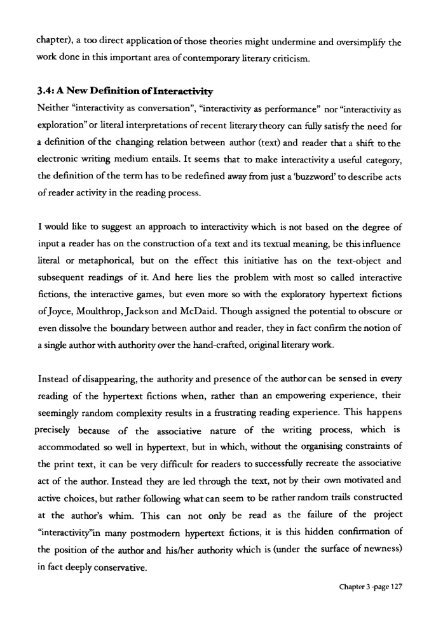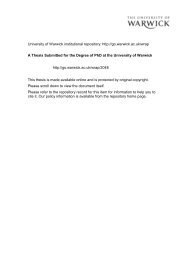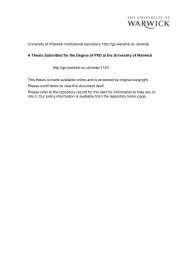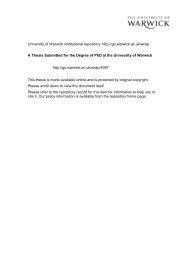From Page to Screen - WRAP: Warwick Research Archive Portal ...
From Page to Screen - WRAP: Warwick Research Archive Portal ...
From Page to Screen - WRAP: Warwick Research Archive Portal ...
You also want an ePaper? Increase the reach of your titles
YUMPU automatically turns print PDFs into web optimized ePapers that Google loves.
chapter), a <strong>to</strong>o direct application ofthose theories might undermine and oversimplify the<br />
work done in this important area ofcontemporary literary criticism.<br />
3.4: A NewDefinitionofInteractivity<br />
Neither "interactivity as conversation", "interactivity as performance" nor "interactivity as<br />
exploration" or literal interpretations ofrecent literarytheory can fully satisfy the need for<br />
a definition ofthe changing relation between author (text) and reader that a shift <strong>to</strong> the<br />
electronic writing medium entails. It seems that <strong>to</strong> make interactivity a useful category,<br />
the definition ofthe term has <strong>to</strong> be redefined awayfrom just a 'buzzword' <strong>to</strong> describe acts<br />
ofreader activity in the reading process.<br />
I would like <strong>to</strong> suggest an approach <strong>to</strong> interactivity which is not based on the degree of<br />
input a reader has on the construction ofa text and its textual meaning, be this influence<br />
literal or metaphorical, but on the effect this initiative has on the text-object and<br />
subsequent readings of it. And here lies the problem with most so called interactive<br />
fictions, the interactive games, but even more so with the explora<strong>to</strong>ry hypertext fictions<br />
of]oyce, Moulthrop,]ackson and McDaid. Though assigned the potential <strong>to</strong> obscure or<br />
even dissolve the boundary between author and reader, they in fact confirm the notion of<br />
a single authorwith authority over the hand-crafted, original literary work.<br />
Instead ofdisappearing, the authority and presence of the author can be sensed in every<br />
reading of the hypertext fictions when, rather than an empowering experience, their<br />
seemingly random complexity results in a frustrating reading experience. This happens<br />
precisely because of the associative nature of the writing process, which is<br />
accommodated so well in hypertext, but in which, without the organising constraints of<br />
the print text, it can be very difficult for readers <strong>to</strong> successfully recreate the associative<br />
act of the author. Instead they are led through the text, not by their own motivated and<br />
active choices, but rather following what can seem <strong>to</strong> be rather random trails constructed<br />
at the author's whim. This can not only be read as the failure of the project<br />
"interactivity"in many postmodern hypertext fictions, it is this hidden confirmation of<br />
the position of the author and his/her authority which is (under the surface of newness)<br />
in fact deeply conservative.<br />
Chapter 3 -page 127





